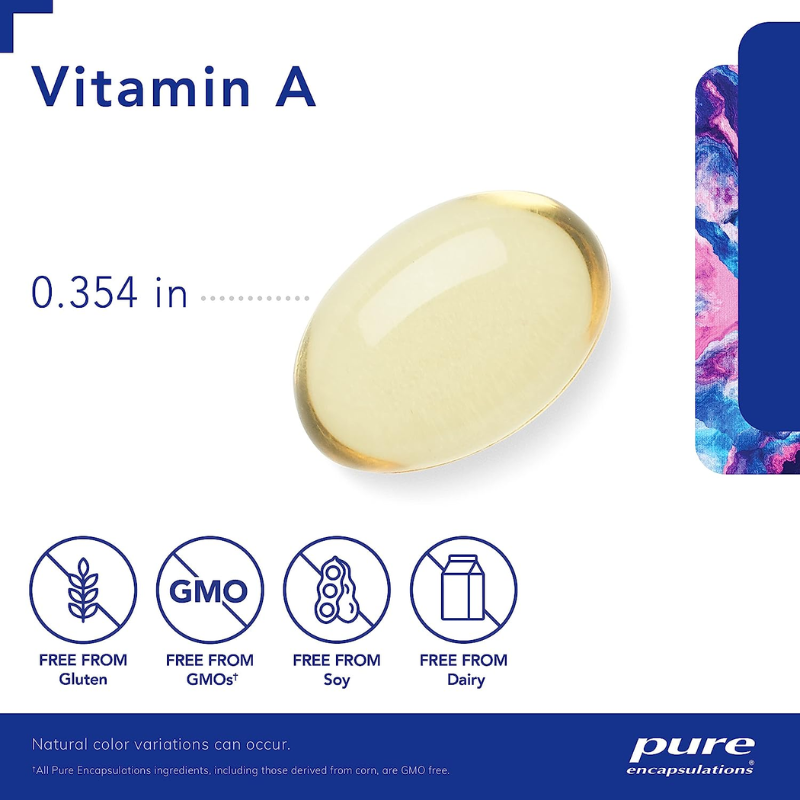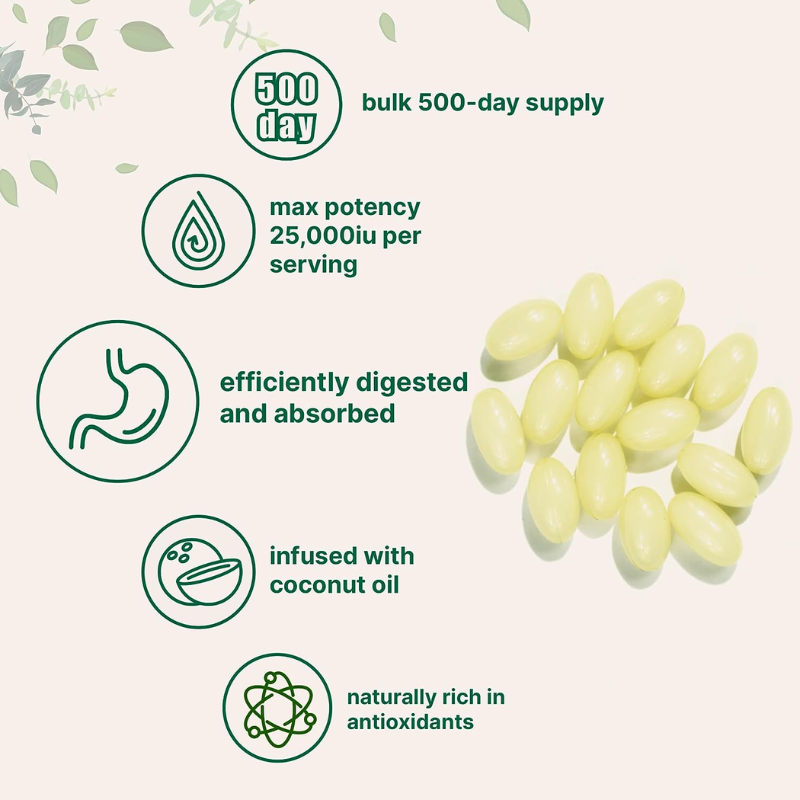Learn 11 Ways Your Body Can Benefit from Vitamin A
Embark on a captivating journey towards better health as you discover “The Top 11 Benefits of Vitamin A”! It’s a remarkable insight into how this essential vitamin can enhance your wellness and improve various aspects of your life, from boosting your immune system to improving your vision. In this post, our goal is to fuel your curiosity, enhance your knowledge, and inspire your journey towards a healthier you with the benefits of Vitamin A.
1. Boosts Immune System
Vitamin A plays a vital role in enhancing your body’s immune system. This crucial nutrient is vital for maintaining the skin’s and mucosal cells’ health and integrity, the first lines of defense in your body’s immune response.

How Vitamin A Enhances Immunity
Generally, vitamin A provides an immunity boost by aiding the production and function of white blood cells, which capture and clear bacteria and other pathogens from your body. This, in turn, can help guard against infectious diseases and keep you healthy.
Research Supporting Vitamin A and Immunity Boost
Studies have indicated that a deficiency in vitamin A can lead to a weakened immune system, making you more susceptible to infections. Conversely, adequate vitamin A intake can enhance immune responses and help to improve outcomes in diseases such as measles and diarrheal illnesses.
2. Supports Eye Health
The benefit of vitamin A for eye health has been extensively recognized. It plays a significant role in maintaining clear vision and preventing certain age-related eye diseases.

Role of Vitamin A in Vision
Specifically, vitamin A helps convert the light that hits your eye into an electrical signal that can be sent to the brain. It’s essential for maintaining the cells in various parts of your eye and can help prevent dryness of the eyes.
Preventing Age-Related Macular Degeneration
Additionally, vitamin A can play a role in preventing age-related macular degeneration (AMD), a common eye condition among people in their 50s and 60s. Research has shown that taking dietary antioxidants, including vitamin A, can help slow down the progression of AMD.
3. Promotes Healthy Skin
For ages, vitamin A has been associated with maintaining healthy skin. It helps to stimulate the production of skin cells, protecting against skin ailments and promoting good skin health.

How Vitamin A Contributes to Skin Health
In terms of skin health, vitamin A helps in the production of sebum, a substance that moisturizes and maintains the health of your skin. Without sufficient vitamin A, your skin can become dry, rough, or bumpy.
Treatment of Acne and Other Skin Conditions
Furthermore, topical and oral forms of vitamin A are used to treat various skin conditions. These include conditions like acne, psoriasis, and certain forms of eczema. The effectiveness in treating these conditions arises from the vitamin’s ability to speed up wound healing and prevent breakouts by regulating the oil production in your skin.
5. Supports Bone Health
Here’s another major benefit of vitamin A—it supports your bone health. This multi-faceted vitamin is crucial in achieving and maintaining high bone density.

Vitamin A and Bone Density
Vitamin A aids in bone growth, a vital process for children and teenagers. However, in adults, maintaining optimal levels of this vitamin also helps promote good bone health and prevent issues related to bone density.
Preventing Osteoporosis
By maintaining healthy bone density, vitamin A plays a role in preventing or delaying osteoporosis, a condition causing fragile bones. However, it’s important to get the right balance—excessive vitamin A, particularly in the form of supplements, can negatively affect bone health.
6. Aids in Cell Growth
Vitamin A plays a primary role in cell growth, impacting important functions like the cell life cycle and division.

Role of Vitamin A in Cell Division
Vitamin A contributes to the growth and division of your cells, which is one of the key bodily functions keeping you healthy. This role includes working in your heart, lungs, and other organs.
Importance for Fetal Development
Vitamin A is also crucial for proper fetal development. It aids in forming and maintaining the heart, lungs, kidneys, and other vital organs in the developing fetus. Pregnant women should be careful with their vitamin A consumption because excess amounts can cause complications.
7. Reduces Risk of Cancer
Some studies suggest that vitamin A might have certain anti-cancer properties, which can help reduce your risk of certain types of cancer.

Impact on Gene Expression
The role of Vitamin A in reducing the risk of cancer is primarily associated with its impact on gene expression. Essentially, vitamin A can control the development and growth of cells, thus potentially reducing the risk of cancerous growth.
Studies on Vitamin A and Cancer Risk
While there are varying views, some studies have found that people who consume diets rich in carotenoids (types of vitamin A) have a reduced risk of certain types of cancer, including lung and bladder cancer. However, more research is needed to confirm these claims conclusively.
8. Promotes Reproductive Health
Both men and women can benefit from vitamin A regarding reproductive health. It’s significantly important in enhancing fertility and promoting healthy fetal growth.

Role in Fertility and Fetal Development
Vitamin A plays a crucial role in reproductive processes in both males and females. For men, it’s essential for sperm production, while for women, it helps the body go through the cycle of growing and releasing the egg.
Relationship Between Vitamin A and Hormone Function
Furthermore, vitamin A has a relationship with certain hormones in the bodies of both women and men. For women, particularly, it helps the female hormones perform optimally during the menstrual cycle.
9. Supports Healthy Teeth and Gums
Vitamin A is also key for maintaining good oral health. This vitamin is critical in keeping your mouth in top condition, from your teeth to your gums.

Importance of Vitamin A for Oral Health
For your oral health, having enough vitamin A is essential. It’s instrumental in proper tooth formation and contributes significantly to the health of your gums and soft tissues in the mouth.
Prevention against Gum Disease and Tooth Decay
Vitamin A also has preventative benefits against certain oral diseases. Its regular consumption can help prevent gum disease and tooth decay as it aids in the production of saliva, essential for washing away bacteria and other harmful elements from your mouth.
10. Assists in Protein Utilization
Vitamin A assists in protein utilization, which can, in turn, positively affect growth, healing, and overall health.

How Vitamin A Boosts Protein Synthesis
Interestingly, vitamin A promotes protein synthesis, which helps your body create the proteins you need for many functions, such as tissue repair and muscle growth.
Importance in Muscle Development and Repair
The role of vitamin A in muscle development and repair is tied to its contribution to protein synthesis. Promoting protein synthesis it helps in muscle development and aids in the healing of muscles post-workout, injury, or surgical procedures.
11. Helps in the Treatment of Measles and Diarrhea
Finally, vitamin A can help in the treatment of certain diseases like measles and diarrheal diseases, providing a significant boost to recovery efforts.

Significance of Vitamin A in Combatting Measles
In dealing with measles, vitamin A is known for reducing the severity of complications and mortality risk associated with this viral disease, especially in children.
Its Role in the Management of Diarrheal Diseases
Diarrheal diseases can cause significant nutrient loss, and vitamin A is often depleted quickly. However, restoring vitamin A levels can help enhance tissue healing and recovery during and after bouts of diarrheal illnesses.
In conclusion, these numerous benefits emphasize the importance of a balanced diet with adequate vitamin A. It truly is a vital nutrient that supports numerous bodily functions and systems. Although it’s possible to get too much vitamin A, it’s also detrimental to get too little. Therefore, it’s crucial to consult a healthcare professional to understand the optimal intake according to your individual requirements.
The Overarching Benefits of Vitamin A
In our journey through the myriad benefits of Vitamin A, it’s evident that this nutrient is a powerhouse for our health. Vitamin A stands out as an essential component of our diet, from bolstering our immune system to ensuring optimal vision, promoting radiant skin, and even playing a role in reducing cancer risks. Its multifaceted benefits underscore the importance of maintaining a balanced intake of this vitamin. As we strive for optimal health and wellness, ensuring the right amount of Vitamin A in our diet can pave the way for a healthier, more vibrant life.





